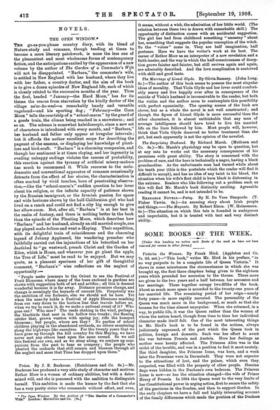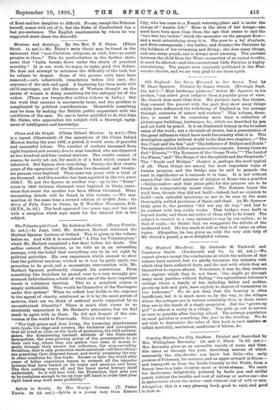SOME BOOKS OF THE WEEK.
[Under this heading we notice such Books of the week as have not been reserved for review in other forms.] Victoria the Woman. By Frank Hird. (Appleton and Co. 7s. 6d. net.)—" This book," writes Mr. Hird in his preface, " in no way purports to be a complete life of Queen Victoria." It shows in some minuteness the circumstances in which she was brought up, the first three chapters being given to the eighteen years which preceded her accession to the throne. Three more are given to the two years and a half between her accession and her marriage. These together occupy two-fifths of the book. About as much more space is accorded to the twenty-one years of her married life. The remaining period of her reign—nearly forty years—is more rapidly narrated. The personality of the Queen was much more in the background, so much so that she became for the time almost unpopular. When she returned, in a way, to public life, it was the Queen rather than the woman of whom the nation heard, though from time to time her individual character made itself felt. One of the most interesting things in Mr. Hird's book is to be found in the notices, always judiciously expressed, of the part which the Queen took in politics, foreign and domestic. Such was her effort to avert the war between Prussia and Austria. Here her feelings as mother were keenly affected. The Princess Alice was in the midst of the trouble, and was in a position to feel it most acutely. Her third daughter, the Princess Irene, was born, and a week later the Prussians were in Darmstadt. They were not superior to the attractions of loot, and the palace, which even they respected, was filled with the property of other people. Hessian flags were hidden in the Duchess's own bedroom. The Princess Irene is now—so has the situation changed—the wife of Prince Henry of Prussia. In 1884 the Queen went to the very limits of her Constitutional power in urging action, first to secure the safety of the garrisons in the Soudan, and then to support Gordon. In the early chapters we have a full and highly interesting account of the family differences which made the position of the Duchess
of Kent and her daughter so difficult. No one, except the Princess herself, comes well out of it, but the Duke of Cumberland has a bad pre-eminence. The English reactionaries by whom he was supported must share the discredit.











































 Previous page
Previous page